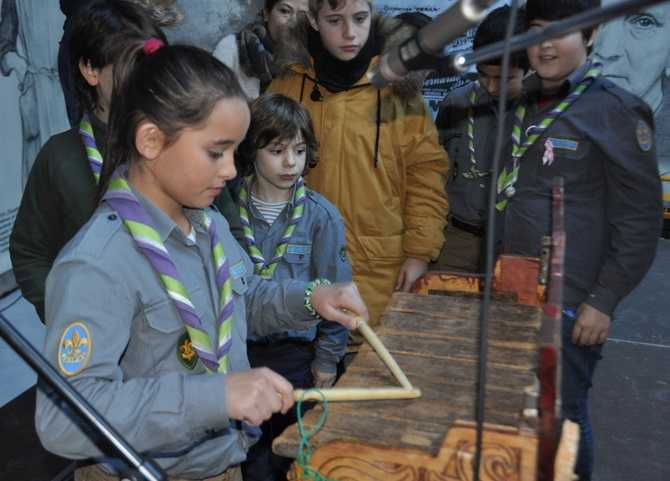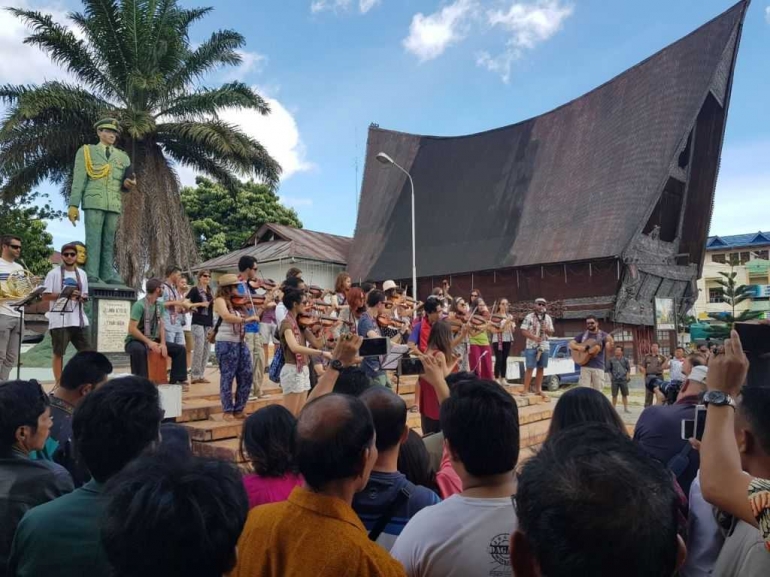Address
Jl. Stella 1 No. 27 Simpang Selayang Medan Tuntungan 20135
Work Hours
Monday to Friday: 7AM - 7PM
Weekend: 10AM - 5PM

The powerful melody of Sinanggar Tullo resounded majestically, and at that very moment, the audience rose from their seats to begin dancing the tor-tor. The atmosphere resembled a lively celebration in North Sumatra, yet it was actually unfolding thousands of kilometers away from the Batak homeland — at the Oscar Niemeyer International Cultural Centre, the most prominent performing arts venue in the city of Avilés, Asturias, Spain. On that night, the concert hall became the stage for a music performance titled “Sinfónico Indonesia”.
The concert was part of Indonesia’s cultural diplomacy mission to Spain, presented by a Batak Toba uning-uningan ensemble named Mataniari. This ten-member group was in Spain from December 13 to 23, 2017, just a week after performing at the Europalia Indonesia Festival 2017 in the Netherlands and Belgium.
During their stay in Spain, Mataniari conducted a Batak music workshop at Oviedo University together with renowned Indonesian jazz maestro Adra Karim. The workshop received an overwhelmingly enthusiastic response. Many students and local Spaniards had never encountered Batak music before, making it their first opportunity to see, hear, and even try playing traditional Batak instruments such as the sulim, gondang, and garantung.
A child tries playing the garantung. Source: Directorate General of Culture documentation.
A workshop participant learning the gondang percussion. Source: Directorate General of Culture documentation.
The main event of this cultural diplomacy mission was the concert on December 16, 2017, at the Oscar Niemeyer International Cultural Centre. What made this concert special was the collaboration between Mataniari and Adra Karim from Indonesia with the Siero Chamber Orchestra (OCAS), a symphony orchestra based in Asturias.
Organized by the Directorate General of Culture, Ministry of Education and Culture of Indonesia, the event was a continuation of the Vínculos Indonesia 2017 program, previously held successfully in Toba, North Sumatra, and Jakarta from July 27 to August 2, 2017. During that program, OCAS and Mataniari had also held collaborative concerts and workshops that drew much public attention. They even performed in open public spaces such as Balige Market in Toba Samosir and Jakarta’s Old Town district.
OCAS performing at Balige Market in July. Source: OCAS documentation.
The concert, featuring orchestral compositions by OCAS merged with Batak gondang music and Batak opera singing by Mataniari, was a true embodiment of “West meets East” — a harmonious blend of two distinct musical cultures. When OCAS performed in Toba and Jakarta, many Indonesians were astonished at how seamlessly orchestral music could blend with traditional Batak music. A similar reaction occurred in Spain, as it was a completely new experience for them.
In between performances, Mataniari members shared the meanings behind the Batak songs they presented. Meanwhile, OCAS representatives spoke about how the natural landscape and climate around Lake Toba reminded them of Asturias. They also fondly recalled the warmth and hospitality of the Indonesian people during their visit in July–August.
In addition to Avilés, Mataniari also performed in other cities across Asturias: Gijón, Oviedo, and Siero. These events were coordinated technically by OCAS as the local host. However, OCAS did not participate in all of the concerts, preferring to spotlight Mataniari and allow Batak music to take center stage.

Mataniari performing in Asturias. Source: Directorate General of Culture documentation.
Thanks to this cultural diplomacy tour, more people in Spain had the rare opportunity to witness a live Batak traditional music performance. It was a much-anticipated moment, as very few Batak traditional music groups from Indonesia had ever performed there. Many in the audience may have never even heard of the Batak ethnic group and its rich musical and vocal arts.
The Batak music performed by Mataniari seemed to mesmerize concertgoers throughout their tour in Spain. The beating rhythms of gondang evoked a spiritual connection to the Batak homeland. When asked after the concerts, several audience members said there was something deeply mystical about Batak music. In Batak culture, music is an integral part of daily life, which gives the lyrics of their songs a unique soul and profound philosophical depth.
The tor-tor dance also left a strong impression on the audience because of its simplicity. With just one glance at others dancing tor-tor, they were able to follow along. Dancing tor-tor to Sinanggar Tullo became a memorable experience for many, giving them a genuine taste of Batak culture. Some even expressed a desire to travel to Indonesia — specifically Lake Toba — captivated by the cultural richness they had just witnessed.
